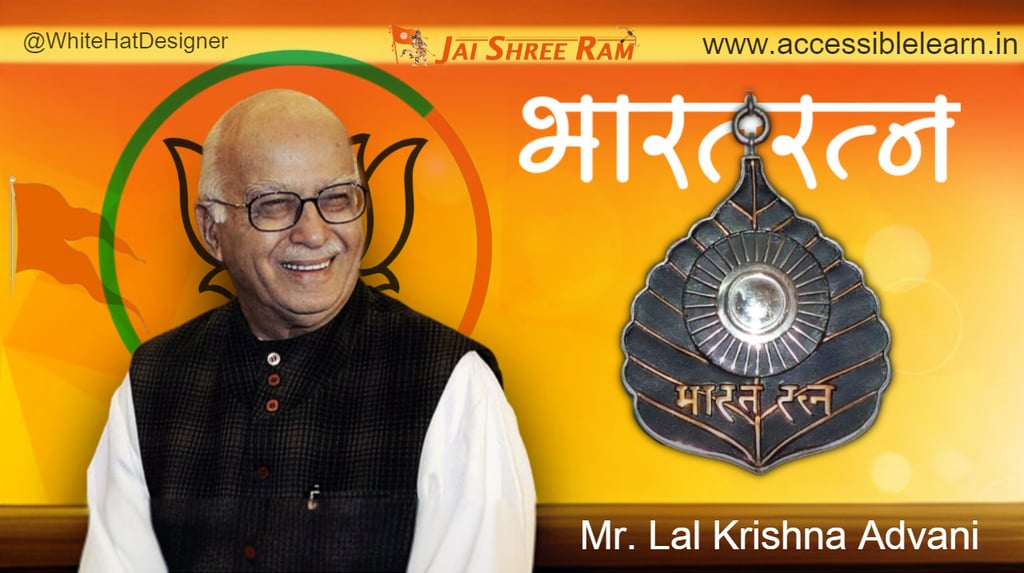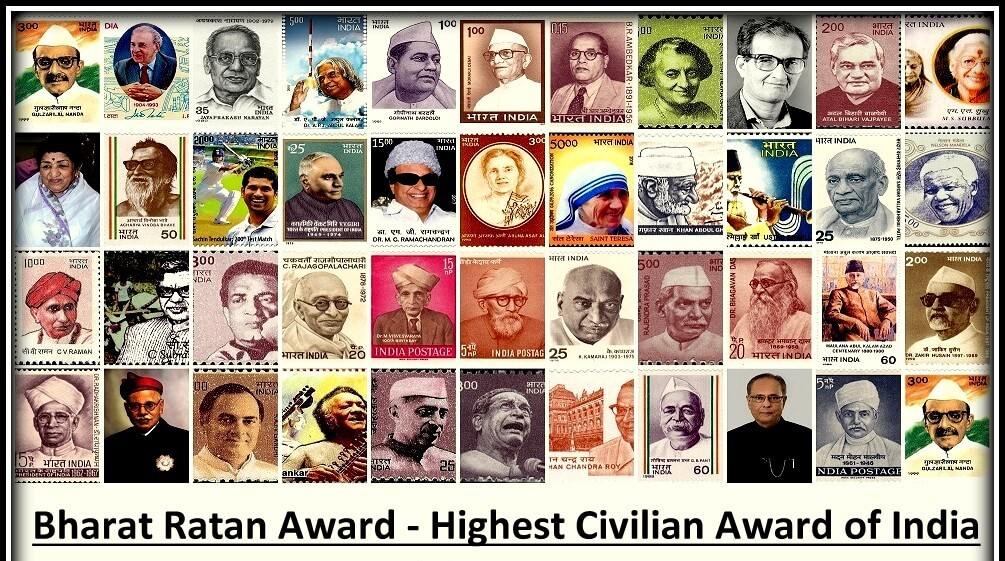
Shining Stars: Celebrating Bharat Ratna's Trailblazers of Indian Politics
The enduring legacies of L.K. Advani, a key architect of the BJP and Hindutva movement, and Karpoori Thakur, a champion of social justice. Learn how their contributions reshaped Indian politics and earned recognition through the prestigious Bharat Ratna.
BJPBIOGRAPHY/HISTORYRSSTHE GREAT LEADERPOLITICAL JOURNEY
Keshav Jha
2/8/20243 min read


Bharat Ratna, the highest civilian distinction in India, has served as a symbol of national pride and respect since its establishment in 1954. Over the years, it has been conferred upon extraordinary individuals whose exceptional contributions have illuminated various facets of the nation. The recent laureates of this esteemed honour, L.K. Advani and Karpoori Thakur, embody the diverse landscape and contemporary ethos of Indian politics.
Bharat Ratna award list!
Indira Gandhi
L.K. Advani: Architect of Modern BJP and the Hindutva Movement
Lal Krishna Advani, a prominent figure within the Bharatiya Janata Party (BJP), has made a profound impact on the modern political landscape of India. A committed follower of the Rashtriya Swayamsevak Sangh (RSS) since his formative years, Advani has been a pivotal architect of the Hindutva ideology that redefined India's political narrative. His significant role in the Ram Janmabhoomi movement not only inspired a cultural and religious renaissance but also reoriented the BJP’s political journey, elevating it to a national stature.
Advani's leadership during the Ayodhya movement culminated in the historic construction of the Ram temple, fulfilling a long-held cultural aspiration for millions. His speeches, insightful vision, and political strategies have been crucial in transforming the BJP into a formidable political entity, earning him recognition as one of the most influential leaders in post-independence India.
Karpoori Thakur: Champion of Social Justice and Bihar's Political Trailblazer
In parallel to Advani's ascent, Karpoori Thakur emerged as a revered socialist leader devoted to advancing social justice and ensuring equitable representation for marginalized communities. Frequently referred to as the "Jan Nayak" (people's leader), Thakur represented a staunch voice against caste discrimination and economic inequality.
During his tenure as Chief Minister of Bihar in the 1970s, Thakur enacted transformative policies, including the introduction of reservations for backward classes in government employment and educational institutions. His bold initiatives challenged the Congress Party's preeminence in Bihar and established a new political paradigm focused on empowerment and social equity. Thakur's legacy was further solidified by his posthumous Bharat Ratna award, recognizing his relentless commitment to social justice and his substantial influence on the political dynamics of the Hindi heartland.
Bharat Ratna: Honoring India’s Luminaries and Their Legacy
The Bharat Ratna, India’s highest civilian accolade, serves as a symbol of recognition, honoring individuals whose contributions have significantly molded the nation’s socio-political, cultural, and economic framework. From distinguished leaders such as Atal Bihari Vajpayee and Madan Mohan Malaviya to intellectual giants like Dr. B.R. Ambedkar and cultural figures like Bhupen Hazarika, the recipients of this prestigious honor epitomize the diverse tapestry of India.
Atal Bihari Vajpayee, through his poetic eloquence and statesmanship, significantly enhanced India’s international stature, whereas Madan Mohan Malaviya was a champion of educational reform and cultural revival. Similarly, Dr. Ambedkar, as the chief architect of the Indian Constitution, symbolizes empowerment and equality, and M.G. Ramachandran continues to inspire through his visionary leadership in Tamil Nadu.
The Bharat Ratna not only acknowledges these remarkable individuals but also reinforces India’s commitment to its pluralistic ethos and democratic values. By honoring diverse contributions—whether it be the groundbreaking achievements of Advani or the social justice legacy of Karpoori Thakur—the award reflects the rich mosaic of ideologies, cultures, and aspirations that characterize India.
A Tribute to India's Democratic Spirit
As India navigates its complex political landscape, the legacies of leaders like Advani and Thakur serve as guiding beacons. The Bharat Ratna underscores the significance of acknowledging individuals who have profoundly impacted society and left a lasting legacy. Their contributions continue to inspire future generations, charting a course toward a more inclusive, equitable, and democratic India.
By honoring these distinguished figures, India not only celebrates their extraordinary accomplishments but also reaffirms its steadfast commitment to the principles of justice, equality, and cultural harmony.
The influences of L.K. Advani and Karpoori Thakur exemplify the rich diversity and depth of India’s political heritage. While Advani’s unwavering commitment to Hindutva and his transformative role in the BJP's ascendance redefined national politics, Thakur’s passionate advocacy for social justice and equity significantly reshaped Bihar’s political landscape. Both leaders represent distinct yet equally compelling facets of India's democratic journey.
The Bharat Ratna, as the nation's highest civilian award, stands as a testament to the enduring legacies of such luminaries. By recognizing their contributions, India celebrates not just their achievements but also the pluralistic values and democratic principles they espoused. Their legacies continually inspire future generations, reminding us of the transformative power of leadership, vision, and commitment in shaping a more promising future for the nation.


Subscribe to our newsletter
All © Copyright reserved by Accessible-Learning
| Terms & Conditions
Knowledge is power. Learn with Us. 📚


